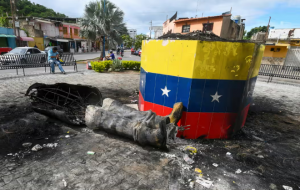As protests over Venezuela’s disputed presidential election spread across the country, opposition supporters have focused their fury on president Nicolás Maduro’s predecessor and political mentor, Hugo Chávez.
At least seven statues of the former leader have been attacked, some beheaded with sledgehammers, and some completely torn down.
In the seaside city of La Guaira, 30km from the capital Caracas, a group of protesters tore down a 3.5-metre Chávez monument which had been inaugurated in 2017 by Maduro, shouting: “This government is going to fall.”
In Coro, the capital of Falcón state, protesters were filmed attacking a concrete statue of Chávez, the former paratrooper who ruled Venezuela from 1999 until his death in 2013. Cheers erupted as the monument fell, and a protester waved a Venezuelan flag over the crumbled remains.
In the city of Calabozo, in Guárico state, protesters used hammers and a metal pole to push over another effigy of the saluting strongman.
This is not the first time that statues of Chávez have been attacked: several were targeted down during a previous wave of unrest in 2017, which more than 160 people died.
But the sheer number of monuments defaced is something new, said Jesús Castellanos, a consultant for the NGO Transparencia Electoral.
“The destruction of so many statues at once is a product of the level of dissatisfaction and discontent over the national electoral council (CNE) calling a victory for Maduro, which does not reflect the reality of what occurred on Sunday,” said Castellanos.
The government-controlled electoral court officially declared Maduro the winner on Monday after a campaign in which opinion polls indicated a strong lead for the main opposition candidate, Edmundo González.
Since then, the opposition, independent observers and neighbouring countries – including the leftwing governments of Colombia and Brazil – have called on the CNE to release voting tally sheets, which it has refused to do so far.
“This is very serious, especially when there are serious doubts about whether the data is accurate,” said Castellanos.
On Tuesday evening the Atlanta-based Carter Center, an NGO founded by Jimmy and Rosalyn Carter focused on conflict resolution, said it was unable to verify the results, blaming authorities for a “complete lack of transparency” in declaring Nicolas Maduro the winner without providing any individual polling tallies.
The Associated Press called the statement “perhaps the harshest rebuke yet” of Venezuela’s chaotic election process because it came from one of just a handful of outside groups invited by the Maduro government to observe the vote.
“The electoral authority’s failure to announce disaggregated results by polling station constitutes a serious breach of electoral principles,” the Carter Center said. The group, which had a technical mission of 17 experts spread out in four cities across Venezuela, added that the election did not meet international standards and “cannot be considered democratic.”
The opposition leader, the conservative former lawmaker María Corina Machado, claimed on earlier Tuesday to have copies of 84% of the voting tallies from polling stations. “They are irrefutable and irreversible proof that we won,” said Machado, who led González’s campaign.
Meanwhile, protests are facing harsh repression from the authoritarian government.
According to the NGO Foro Penal, at least 11 people have been killed by the security forces, including a 15-year-old boy and a 16-year-old girl.
“Unfortunately, the government does not respond to the protests with dialogue and conversations; instead, political protests are repressed,” the NGO’s president, Alfredo Romero, told the NTN24 TV channel.
Addressing supporters outside the presidential palace on Tuesday afternoon, Maduro said security forces were pursuing those behind the attacks – which he has likened to the images from revolutions in post-Soviet states including Ukraine and Georgia, which he claimed were fomented by the US.
“They have been captured, they are under arrest and they will be punished with the full force of the law,” Maduro vowed, before bellowing: “Respect history! Respect the law!”
The Guardian

